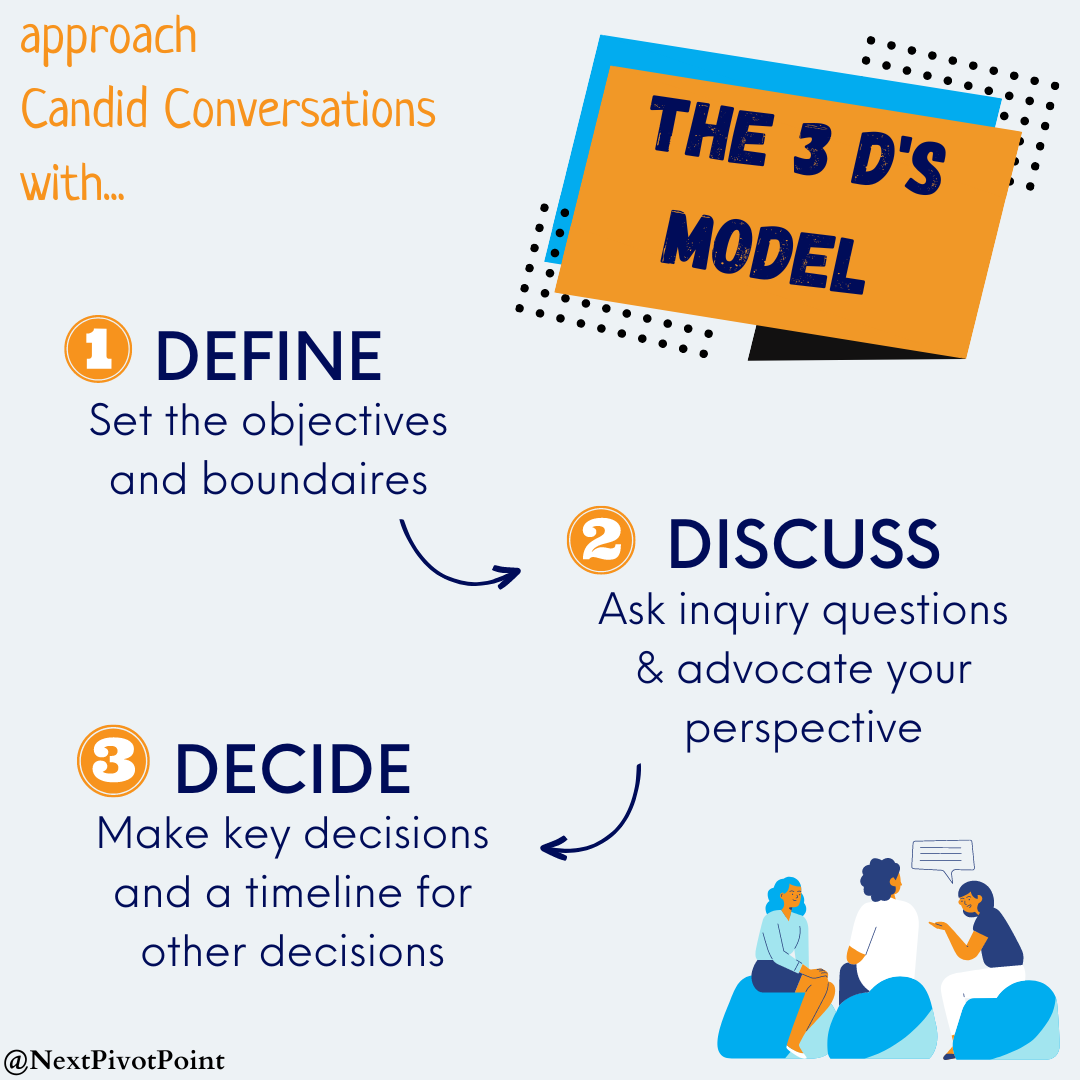Candid conversations can be hard. Here’s how to have uncomfortable conversations productively.
I get this question from leaders often, “how do I have a conversation with someone about something difficult?”
It’s a tough one as a leader. I get it. I wrestled with this endlessly throughout my career leading teams. Often, as leaders, it is our duty to share feedback and unpleasant information with our team. This can feel stressful, and we procrastinate the tough talk, just hoping “It will get better.”
Yet, as I coach and speak to leaders, I see how uncomfortable, candid conversations can have a positive impact, when done effectively. When done well, the relationship improves through increased trust, and the team member can feel safer knowing that people care enough about them to share something difficult.
Some scenarios I hear…sound familiar?
- Someone on my team is (fill in the blank unfortunate attribute). I don’t want to be the one to tell them.
- I know they are going to get emotional when I share this, I just don’t want to rock the boat.
- I don’t know if this person can change, should I even bother?
Flip the script. What if we looked at these situations as an opportunity to improve communication and make positive change?
In each of the scenarios above, there is an opportunity to illuminate to someone something they may not know about themselves. You see something that they may not see. Acknowledge the power of that, and then channel that vantage point to park your own feelings and think about what knowing this could do for them. Remind yourself that it is selfish to withhold information from someone and that being clear is kind!
Top best practices and ideas for a productive, candid conversation:
- Assume positive intent. Remind yourself before initiating the discussion, that this person likely cares about their performance and would not be doing something intentionally to disrupt the team.
- Stick to the facts. Feedback is not personal. The words you use matter. Shift from dramatic, emotional language to facts, behaviors, and impacts.
- Flex your style. People do not change for us. People only change when they see the benefits of change and why their current behavior will not lead to future success. Think about what you could do to help versus asking them to change initially.
- Be vulnerable. Admitting that it is difficult for you to share this or that you feel emotion is okay. You need the audience to feel safe to open up, and this is best embodied by the leader through vulnerability based trust.
As Kim Scott outlines in her book, Radical Candor, radical candor means to “care personally and challenge directly.” To me, this means that just because you care about someone doesn’t mean you believe they are perfect. In fact, as you care more about someone, you are likely to see more of their unique flaws and limitations, and have a better point of view to share with them for them to be better. Her work expands on this concept, along with other great reads – Fierce Conversations and Crucial Conversations – all provide helpful tools, ideas, and stories to have productive, uncomfortable conversations.
A step by step model for a productive candid conversation.
In my research, I have created a three-step model for facilitating candid conversations productively. I call it the the 3 D’s model.
- Define: This involves setting the stage for the conversation. This is where you clearly define the objectives and boundaries for your candid conversation. Be clear up front what success looks like by having an outline ready for what you’d like to discuss, and showing vulnerability up front.
- Discuss: Good conversations are two-way dialogues where all voices are heard. To do this, ask inquiry questions like ” what would you like to see more of/less of…” and advocate for your perspective with comments like “I agree with you on…” or “I would add…”.
- Decide: Do not forget this critical step. After having the candid conversation, make sure it is cemented with action. This is where we need to make key decisions and a timeline for other decisions. Asking “what did we decide to do today?” or “what will you commit to doing as a result of this conversation?” promotes positive change.
Behavior or cultural change does not happen swiftly, it takes a series of productive candid conversations to drive transformation. Practice effective communication and conflict skills like the 3D’s model and these best practices, and those around you will start to model this behavior as well.
At Next Pivot Point we have lots of resources to help you facilitate successful diversity and inclusion training. Schedule some time with our team today to discuss where to start or how to do better. You can also check out:
- Our available workshop topics for developing inclusive leaders.
- Our Train the Trainer programs for scalability within your organization
- Our Right-Sized DEI micro-content packages for consistent small-drip content throughout the year.

